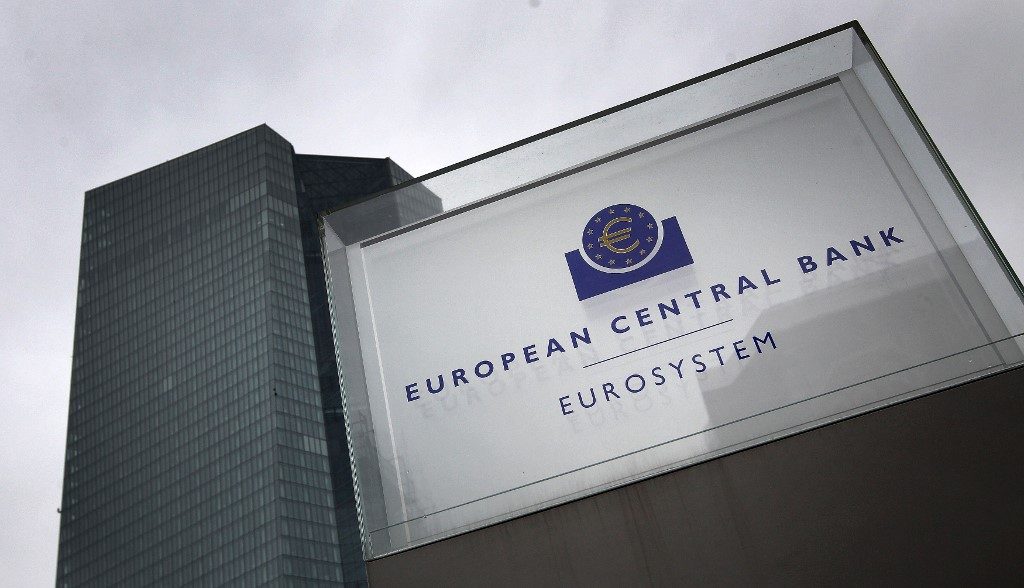SUMMARY
This is AI generated summarization, which may have errors. For context, always refer to the full article.

FRANKFURT AM MAIN, Germany – The European Central Bank (ECB) on Wednesday, March 18, unexpectedly said it would spend 750 billion euros on “emergency” bond purchases, as it joined other central banks in stepping up efforts to contain the economic damage from the coronavirus.
The so-called Pandemic Emergency Purchase Program comes just 6 days after the ECB unveiled a big-bank stimulus package that failed to calm nervous markets, piling pressure on the bank to open the financial floodgates.
The $820-billion scheme to buy additional government and corporate bonds will only be concluded once the bank “judges that the coronavirus COVID-19 crisis phase is over, but in any case not before the end of the year,” the ECB said in statement.
The decision came after the bank’s 25-member governing council held emergency talks by phone late into the evening, following criticism the bank wasn’t doing enough to shore up the eurozone economy.
“Extraordinary times require extraordinary action. There are no limits to our commitment to the euro,” ECB chief Christine Lagarde tweeted.
The remarks echoed the legendary words of her predecessor Mario Draghi who in 2012 vowed to do “whatever it takes” to preserve the euro at the height of the region’s sovereign debt crisis.
In a tweet, French President Emmanuel Macron welcomed the ECB’s “exceptional measures” and urged governments to back it up with fiscal action and “greater financial solidarity” in the 19-nation currency club.
Tokyo stocks opened more than 2% higher on news of the ECB’s latest support package.
‘Game changer’
Fears of global recession have grown as the pandemic triggers unprecedented lockdowns, upending normal life and bringing top economies to a grinding halt.
By massively buying up government and corporate debt, the ECB aims to keep liquidity flowing in a bid to encourage bank lending and investment.
The practice is known as quantitative easing (QE) and is a key crisis-fighting tool in monetary policy.
“The governing council will do everything necessary within its mandate,” it said in its statement, adding that the size of the asset purchases could be increased if needed.
To further reassure markets, the bank said it would consider relaxing some self-imposed restrictions on bond purchases – which could potentially help countries like debt-laden Italy whose bond yields have soared over the coronavirus panic.
The ECB also decided to ease some of its collateral standards to make it easier for banks to raise funds.
And for the first time, Greek bonds will be included in the bank’s asset purchases.
The immediate reaction from analysts was positive.
The ECB’s latest medicine could be “a game changer for the euro area economy and credit markets” if it was accompanied by fiscal action from governments, Pictet Wealth Management strategist Frederik Ducrozet said.
Not enough
Measures taken by central banks around the world so far have surpassed those of the 2008 financial crisis, with the United States Federal Reserve leading the way.
The Fed has taken interest rates down to virtually zero, and massively increased cash injections into financial markets, including an additional $1.5 trillion last week and $1 trillion so far this week.
It also unveiled a new credit facility to help households and business stay afloat.
Central banks in England, Canada, China, Australia, and Japan have similarly taken emergency steps to keep money flowing through the financial system.
But the ECB surprised observers by shying away from a rate cut at its governing council meeting last Thursday, March 12.
Instead, the Frankfurt institution announced an extra 120 billion euros in QE this year, on top of its current 20 billion a month.
Since 2015, the bank has spent some 2.7 trillion on QE as part of its efforts to boost economic growth and drive up inflation – and Wednesday’s announcement will significantly add to that figure.
Last week’s package also included a fresh round of super-cheap loans to banks and more generous terms to entice lenders to grant loans to small businesses, seen as particularly hard hit by the virus fallout. – Rappler.com
Add a comment
How does this make you feel?
There are no comments yet. Add your comment to start the conversation.